How to avoid scams in the Philippines is easily the longest of my Survival Tips. Not so much because there are hundreds of scams, but more so that I want to describe in detail how these scams work. Hopefully, this means you can avoid them and enhance your chances of survival in the Philippines. Please note that most of these scams happen in Manila as that is where most of the action is. However, they can happen all across the country, especially the tourist areas.
How To Avoid Scams In The Philippines
If you are new to the Philippines, or just about any country for that matter, there are scam artists looking to take advantage of your lack of local knowledge. The most important thing to remember is, regardless of how long you have been here for, or how well you know the country, if you are caucasian in particular you are always an obvious target. However, this is not just the case if you are Caucasian. You could be Indian you could be Middle Eastern, you could even be Japanese or Korean. It doesn’t really matter but if you don’t really look like a Filipino, then you stand out as a foreigner and potential tourist. Automatically, you can then become a target for scam artists.
These people are confidence tricksters who will try to win over your trust. Some of these people have a conniving, premeditated plan to catch you out and scam you. Don’t take it personally – it is just the way it is in a big city with millions of people. Then you have some of these people who are just plain opportunists like beggars and pickpockets who don’t really have a premeditated plan but are still trying to rip you off somehow.
For new visitors to this country, it’s very confronting in many regards, with street beggars being at the top of the list. Frail old ladies with hunched backs asking for money to buy medicine, children with shocking deformities that leave you feeling helpless and sorry, young ladies with babies at the hip asking for money to feed their child. It really does play with your heartstrings. However, you must understand this is usually a distraction to catch you off guard. Therefore, you need to be on your toes at all times.
Most Filipinos Are Very Good People
Before I continue too much further, I would just like to say that a very large majority of Filipinos are good natured and very friendly people, which is one of their great strengths and one of the things I really love about this country. However, and rather, unfortunately, some of these friendly people use their “friendliness” to take advantage of you. These particular people are professional scammers and are very good at it, and very convincing. Their intention is to scam money out of you somehow.
If a stranger is being over friendly to you, or overly persistent, this should automatically set the alarm bells off. It’s important that you just politely ignore these people and walk on by – they are not your friends and you owe them NOTHING! As I mentioned this is a very lengthy article but I have written this to highlight some of the most common scams that will confront everyone, not just tourists. If you are an obvious foreigner (not just a westerner but even Korean, Japanese, Indian etc), you will be more of a target. However, even if you live here, or have been here often enough that you feel safe, you can still fall prey to these scams. Hopefully, these tips will enhance your chances of not just surviving these scams, but avoiding them completely.
SCAM #1: The Familiar Face Scam
You have just arrived in the Philippines for the first time. You are on your own. Like most people, you will most likely stay in a hotel. If you have flown from Europe or the US you will no doubt be tired, but there will also be adrenaline coursing through your veins. If you have arrived during the day, you will more than likely be wanting to go and explore your local surrounds rather than sleep.
You arrive at your hotel. You might have got a taxi from the airport, you might have organised a hotel car, you might even have even had a Grab Car drop you off at the hotel. You might be staying in a small hotel or even a hostel, or you could be staying in a 5-star hotel. However, the sight of a foreigner unloading his luggage from a vehicle and taking it into the hotel lobby is an obvious sign that you are a tourist, or at least don’t live here permanently. You don’t think anything of it.
You walk into the lobby with the bellboy following you in tow with your luggage. You are greeted warmly at the door as you enter the lobby “Good afternoon Sir, welcome to Hotel Blah. How can I help you?”. In fact, you may have several people give the same greeting as you approach the check-in counter. If you are a westerner, you will obviously stand out a little bit more and receive more attention from the staff. So much so that you might even feel like a rockstar. If you are not used to being treated like this all of a sudden you feel a little special. Most hotels are obviously courteous when new guests arrive, but no country does it better than the Philippines. It is normal to them as they are just naturally friendly people. This makes you relax so you also let your guard down because you feel safe in the company of people that you trust.
You check into your room and drop off your luggage. You will most likely charge your electronic devices like your mobile phone, maybe take a shower and change your clothes. You’re feeling cool. You’re feeling fresh. You are in a new country and minutes earlier upon your arrival, you were greeted as if you were a celebrity or movie star. By now you’re feeling pretty confident, so it’s time to go and explore the surrounds.
If you are on your own you may want to go and chill out at a nearby bar, cafe or restaurant. You’re casually walking down the street taking in the new sights and sounds. You’re trying your best to avoid all the obstacles like potholes in the footpath and jeepneys that nearly run you over as you try to cross the road, or motorbikes riding down the footpath. You’re not exactly sure where you’re going as you are still new to the area. You might even have Google Maps on your mobile phone showing you where to go. Then you are approached by a friendly Filipino on the street claiming to know you from your hotel.
Little do you know that this guy has been watching you from the moment that you got out of the vehicle and checked into your hotel. This will generally be a man who claims to be a security guard from your hotel, a bellboy, cleaner or whatever. It matters little as all he is trying to do is win over your trust. As you are new to the country, you don’t want to be rude or ignore him so you start engaging with him.
While you are talking with him you are trying to place his face but as you were checking into your hotel, and passing through security, and looking out for the bellboy with your luggage, you weren’t really paying attention to exactly what these people look like. Maybe he was a security guard? Maybe he was the bellboy? Maybe he was the guy holding the door open for you? You’re not really sure as they all have straight black hair and brown skin, but you also don’t want to be rude.
This friendly and helpful Filipino may offer to take you sightseeing. He may ask where you’re going and offer to be of assistance by taking you there the best way. He may ask which country you’re from and start with the small talk about having an auntie who lives there. This situation can lull you into a false sense of security and make you feel welcome and place your trust in this person.
If you accept his offer to assist you, you may find yourself in a situation in which you can either be robbed, have your drink spiked if you end up going for a drink with him, or are convinced to part with some money due to this individual claiming to have a family medical emergency. These confidence tricksters will come up with all sorts of weird and wonderful reasons to make you feel sorry for them and hand over your hard-earned cash. You really need to be hard-nosed and keep your guard up at all times.

If a complete stranger is being overly friendly, that is always cause for concern. These people may claim to know you from somewhere, or they might try being overly friendly to win your trust, either way, you need to be careful. As mentioned in my Survival Tip about culture, Filipinos are very caring and sharing. If they are in a group, they are less likely to be scammers but if you get approached by an individual, you need to be a lot more careful.
How to avoid this scam: This may sound quite obvious but the easiest way to avoid this type of this scam is to ignore any strangers who approach you with offers of assistance, particularly on the street. Generally speaking, Filipinos are very shy in speaking English to a foreigner who they don’t know, so will usually wait for you to make the first move. If you are approached by a friendly Filipino on the street, you need to be mindful of their motives. As a good Samaritan, it can be very hard to ignore someone who seems in need, but unless you have money to literally throw away, you simply have no other choice but to ignore them. Do NOT enter into any dialogue with them whatsoever. Simply keep walking and saying nothing is one of the best way to avoid scams in Philippines.
SCAM #2: Peddlers In Tourists Area Scams
This is similar to Scam #1 in which as a foreigner, you clearly stand out. This is even more so in popular tourist areas such as Manila, and the world-famous Boracay and Palawan. Unfortunately, this is where a lot of scammers ply their trade and try to take advantage of the multitudes of unsuspecting tourists.
For example, you will be casually walking along the beach enjoying the beautiful tropical setting, with the clear blue water lapping up against the white sand. However, the serenity is broken by somebody persistently asking you to purchase one, or some, of the many goods they are carrying with them. Sometimes it amazes me at how much junk one individual can carry at the same time.
They will approach you offering everything from acoustic guitars, to feather dusters, through to jewellery and tourist singlets. Twenty times they will ask you if you would like to buy something, and twenty times you will tell them no. In order to escape them, you relent and end up purchasing something. After they have finally left you in peace, you will get 200 metres up the beach only to find a store selling exactly the same item for half the price. Arrrrrgggghhhh!
A lot of the time the items peddled by these “street vendors” can be fake. We will talk more about fake goods a bit later on. Depending on what the item is, this may influence your purchasing decision. For example, if you purchased an imitation DVD series and found out later you could’ve bought the genuine item for half the price you paid, that won’t make or break your holiday. However, purchasing a fake Rolex or some other mechanical or electronic device is another matter. The point here is to avoid buying expensive items. If you’re looking for a cheap memento that’s cool. After all, you are on holiday. However, if you do indeed buy something, make sure you haggle first!
How to avoid this scam: It can be difficult to avoid scams in Philippines like this. In most tourist locations, particularly in the provincial areas where most of the beautiful places in this country are, there are a lot of low-income earners. Their livelihoods depend on selling these items to tourists. I am a big advocate of supporting the local economy however, I don’t want to be ripped off in the process. It is a real conundrum.
As mentioned, you can live with being ripped off if it’s just a singlet or t-shirt but if it’s something of higher value, and has the capacity to stop working, that can leave you with a very sour taste in your mouth. If in doubt, do not buy! If it helps you, just give the guy P50 or P100 (say $1-2) and wish him all the best. He will be able to get a meal out of that so at least you have still contributed in some way. That’s better than forking out $100 for a Rolex that won’t be working by the time you get back to your hotel.
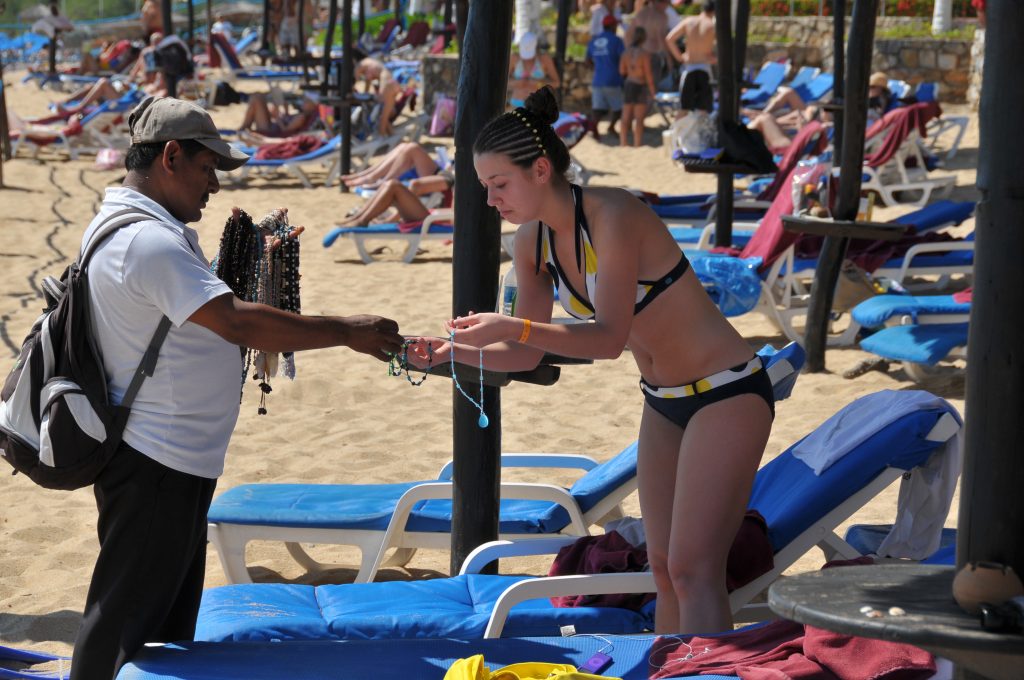
Tourist areas are full of vendors trying to sell you all sorts of weird and wonderful things. They prey on tourists as they know tourists usually spend up big and always want to buy a memento of their trip. Unfortunately, most of these people are trying to rip you off.
SCAM #3: Taxi Driver Scams
Here is one of my personal favorites – taxi drivers. There are so many scams operated by taxi drivers it is almost impossible to know where to start. Let me start off by saying that taxis are a convenient, cheap and plentiful mode of transport, particularly in Manila. You can get yourself from one side of town to the other for less than USD8-10. Unfortunately, there are a number of taxi drivers that will try to extract as much money from you as they can. For some unknown reason, it just seems inherent for taxi drivers to be rip-off merchants.
Not everyone has the luxury of being able to get a Grab Car (the SE Asia version of Uber), and not everyone has the Waze traffic app. Therefore, it is important that I talk about taxis and some of the tactics they use to try and extract extra money from you.
- Firstly, if you are a foreigner, taxi drivers naturally assume that you are a tourist. Therefore, they try to take advantage of the fact that you don’t know your way around. They do this is by engaging you in conversation once you hop inside the cab to try and distract you. While this is happening, they have conveniently “forgotten” to turn on the meter. The next thing you know you are 5 or 10 minutes into your trip and you have no idea how much it has cost you so far. So, of course, you ask the driver how much it will cost and he will always reply with “it’s up to you”. If you are new to the place, how do you know how much it should cost? Taxi Driver 1, Tourist 0.
- Secondly, they will try to take you on the longest route possible to try and justify charging you a higher rate. This actually applies regardless of whether or not they have used the meter. And of course, because you are new to the place, you don’t know how much it should cost and what is a fair rate, even if you are willing to pay a bit over the normal rate. Taxi Driver 2, Tourist 0.
- Thirdly, they will look at you with puppy dog eyes and tell you that the traffic is very bad and for you to just pay them an agreed figure without turning the meter on. Of course, if you are new in town, and you have not taken your route before, you have no idea how much it should cost and what is fair and reasonable. So they will then insist on a figure and if you are in a rush, and there is a tropical rainstorm and you’re desperate, you will probably accept whatever they offer you. Taxi Driver 3, Tourist 0.
- And last but not least, check the meter hasn’t been tampered with. In Tagalog, this is known as batingting. This isn’t so common these days but there is still the odd taxi that does actually have the meter running, but they have tampered with their meter to display inaccurate readings. Of course, this is to the benefit of the driver. All taxis are required by law to have their meter sealed to prevent any tampering. This basically looks like a snap-lock plastic bag tie which you will see attached to the meter. If this is not there, it’s a tell-tale sign that the metre has been tampered with and it’s game over. Taxi driver wins, you lose in a clean sweep 4-0.
I know I’m being a bit flippant here so before I continue, I would just like to acknowledge that we are not talking about a lot of money. However, it is the principal of the matter and the fact taxi drivers are taking advantage of the weary traveller. They should be helping the passenger, not trying to rip them off. I should also say that most taxi drivers are ok, but you really do need to assert some authority over them.
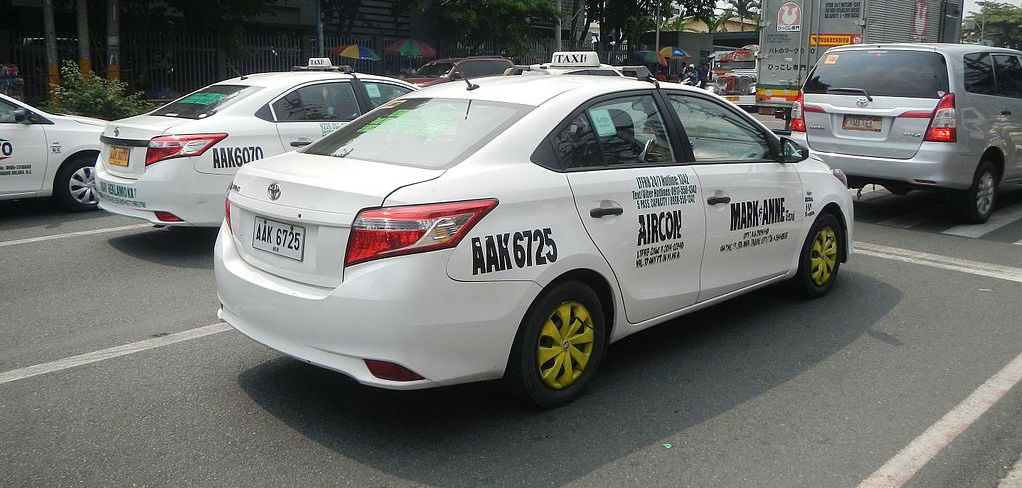
Taxies are notorious for ripping people off, especially tourists who are not familiar with the lay of the land. Now with competitors entering the market like Grab, you are no longer at the mercy of these parasites.
Then, of course, the other thing you must avoid if possible is hopping into a taxi on your own late at night when you have had a big night drinking. Depending on how far you need to travel, it is possible that you may fall asleep in the taxi. Naturally, the taxi driver will play dumb and drive you around in circles trying to maximize his fare. As much as I would love to blame the taxi driver for this, the onus must still be on the individual to make sure they are on the ball, and that the taxi driver does not rip them off (my tip is to wind the window down and turn the music up really loud. Make yourself as uncomfortable as possible so you don’t fall asleep).
I have heard of a couple of instances where foreigners have fallen asleep in a taxi cab and have been driven to an unfamiliar, isolated place and robbed by accomplices of the taxi driver. The taxi driver texts his friend “hey pare (mate), I have a passed out foreigner in the car. Meet you in five minutes at such and such place”. It gets staged as a robbery/carjacking but the taxi driver is part of the heist. You have been warned!
How to avoid this scam: Unfortunately, sometimes you have no other option but to take a taxi. Therefore, you cannot avoid the possibility of some of these scams happening to you. However, if you must use a taxi, my advice is do not hop inside the taxi at all until the driver is very clear on where you want to go, and that he is prepared to turn on the meter. This will usually be met with a frown and a screwed up face when you ask this. However, you can soften the blow by telling them that you will give them a tip. You must also check that the taxi driver has some identification and that the taxicab is clearly marked with operators name and the appropriate licence plates.
At the end of the day, it is not a lot of money so if the fare happens to be, for example, P180, you might just give the taxi driver P200 and tell him to keep the change (P20 is less the 50c). The main priority here is just to keep the taxi driver honest. After all, they are providing a service and that should be their job. All taxis should clearly display the name of the taxi operator, the number plates, the name of the taxi and the driver should display his ID on the dashboard of the taxi. Even take a photo of the cab and its plates. As stressed earlier, you should check these things before you even hop inside the taxi. And, don’t fall asleep in a cab drunk, especially if you’re alone!
SCAM #4: ATM Scams
Wherever there is money you are sure to find a scammer. There is no place more rife for scams than at an ATM machine. There are a number of different tactics used by scammers when it comes to ATM machines. Following are the three most common scenarios:
- Skimming devices. This is a threat to everyone that uses an ATM machine. This does not strictly apply to the Philippines as it can actually apply to any country in the world. However, the Philippines is known as a hotspot for card skimming. Card skimming is designed to capture your card number and also your PIN as you type it into the keypad. This is usually done with a small hidden camera that is virtually undetectable. Once the perpetrators have your PIN and card number, they can use your card anywhere in the world, whether online or even face to face in a shop or restaurant or wherever. I have seen occasions where friends of mine have had their cards skimmed and ended up with a $10,000 purchase overseas that they were obviously not accountable for. Luckily for these people, their bank was able re-credit their account. However, it is still a disturbing thought that a complete stranger has your personal details at their fingertips.
- Distraction method. This method is less sophisticated than card skimming, but it can be equally as effective for the unsuspecting tourist. This happens when scammers operate as a duo. You are at the ATM pulling your money out from the dispenser when you get a tap on the shoulder. A seemingly helpful guy is behind you telling you that you have dropped money or something from your wallet on the ground. As you naturally turn around to look at the ground, his accomplice will come from the queue and snatch your card from the ATM machine. Before you know it, both of them have disappeared. This is a very mischievous method and it is likely that the scammer that the tapped you on the shoulder was watching you key in your PIN. This means they now have full access to your account. Most ATMs these days have CCTV so this method is not as prevalent as it used to be.
- Armed Robbery. This one is not really a scam but something that you need to be very mindful of – flat out armed robbery. Once again, if you are at an ATM you are an obvious target having just withdrawn cash. It has been known for thieves to be observing you while you make your transaction. From this point, there are several different ways in which they will attempt to rob you. It might happen as you are pulling your cash out of the ATM, or it might happen as you are walking away from the ATM. The other thing that could happen is that somebody will be watching you and then follow you up the street until you are isolated or in a dark area. Then they will attempt to rob you. They can also use the distraction method in which they pretend to bump into you while you’re walking away from the ATM, and then pickpocket you, having observed where you put your money after the transaction.
How to avoid this scam: You must be very wary of using ATM machines that are in back streets or dimly lit areas, particularly at night. Preferably, you should use ATMs that are situated at bank branches or in shopping malls. These are least likely to have been tampered with and also have better lighting and security 24/7. It doesn’t hurt to have a quick glance over your shoulder while you’re queuing at the ATM to get a feel of how many people are behind you and if anything looks suspicious.
As far as card skimming goes, the only thing that you can really do is make sure that you cover your fingers when typing your PIN into the keypad. Having said that, most ATM’s these days do have some sort of cover over the keypad. However, your card can still be skimmed so don’t take things for granted. Check out the photo below for more details on how skimming works.

SCAM #5: Foreign Exchange Scams
There are a number of money changers around in Manila that generally offer pretty good rates (click here for currency converter). These are usually a couple of percent better than a bank or hotel. These places are usually very unassuming booths that you will see in the more popular tourist areas. However, this is where one of the oldest tricks in the book can unfold before your eyes without you knowing it. The teller will count the money right in front of you and with a sleight-of-hand, steal a few bills from under your nose. The important thing here is not to leave the counter without counting your money. Make sure the teller sees you doing this or they may think that you are trying to fool them also. Once you’re sure it’s the right amount, make sure to stash it safely before leaving.
The other thing to be aware of is that the P1000 bill (blue) and the P100 (grey) are very similar in colour. If your eyesight isn’t too good, or you are at a bar or a nightclub and the lighting isn’t great, you may mistake a P1000 bill with a P100 bill and hand over a P1000 thinking it is P100. Then you might think that you have no change coming to you so you walk away and shortchange yourself out of about P900. This is also the same with the P20 bill (orange) and P50 bill (red). Although these denominations are a bit smaller, they can still cause some confusion and may lead to you being shortchanged.
How to avoid this scam: Personally, I find that you get a good exchange rate when you withdraw your money from an ATM (depending if your bank or the bank that you are withdrawing from charge a fee, particularly for an international transaction). However, I also understand that there are frequent travellers who do end up with a number of different currencies in their wallet and they want to exchange it. There is nothing wrong with that, you just need to make sure that you are aware of the things I have highlighted above. You should also make sure that you use money changers that clearly post their rates for you to see. And just like using ATMs, you need to make sure that you are not in a vulnerable area that is dimly lit or too isolated. You also need to make sure that you aren’t pickpocketed or robbed just like the scenario as discussed in the last section with regard to ATMs.
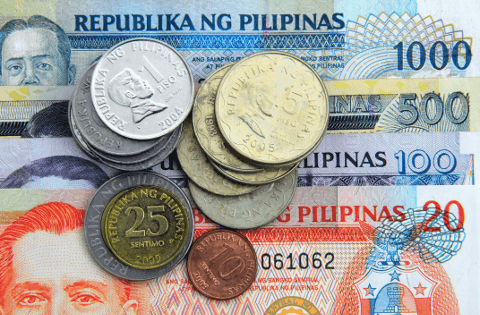
It’s one of the oldest tricks in the book, but if you are changing money at a foreign exchange booth, especially “holes in the wall”, be very wary. The old sleight-of-hand can catch you off guard when you least expect it.
SCAM #6: Beggars – Is It Actually A Scam?
This is quite a difficult topic to talk about as I don’t really consider genuine beggars to be scammers. To me, it is all about the definition of a scammer. Let me clarify this by saying that beggars and scammers are both opportunists. They are both preying on your unfamiliarity of the place and are hoping to catch you off guard and take advantage of your vulnerability. However, my experience tells me that “genuine” beggars don’t necessarily have a predetermined course of action.
Generally speaking, beggars will just come up to you with their hand out and often times, don’t even speak to you. Sometimes they are holding out a cup. Sometimes they are holding a baby on their hip with their hand out. To me, it doesn’t matter what the “front” is, these are mostly genuine people who are victims of society. They are genuine “beggars”. However, scammers have particular skills and a premeditated plan for how they are going to deceive you. From the outset, they are trying to literally scam you out of money through some form of deception. Beggars, on the other hand, will just walk away when you say no to them (although they may persist). From there they will just walk away and go on to the next person.
Having said all of this, it must be said that there are beggars out there that do go the extra mile to try and get money from you. This can include children, disabled people with horrible deformities, blind people or frail old women begging for money on the streets. They will then look at you with their puppy dog eyes and confronting props and keep persisting. They will usually ask for money for food and as hard as it may be, you really need to develop a tough skin and politely ignore them. You will be approached often enough for it to become annoying, so from your first day in the country, you need to learn to ignore them. Don’t even say no or let them engage you in any form of dialogue. If you do relent, you are actually feeding the problem as ironic as that may sound.
Most of the major intersections in Manila will have beggars lurking around. You will have people knocking on your car window asking for money, or you will have people trying to sell you all types of items from acoustic guitars through to hat stands. When you are driving around Manila, it is best to make sure that you have your windows wound up and doors locked at all times. This will usually go without saying as you will almost always have your windows up with the aircon cranking. However, as a safety precaution, you should have your windows wound up so that people can’t reach into your vehicle and steal something.
And then, of course, you do have syndicated groups of beggars that go to extra lengths to extract money from you. This of course borders on scamming. They will work together with pickpockets to try and maximize their take. This may involve the beggar acting as the distraction by begging for money, while the more professional pickpocket is working to extract your phone or wallet from your pocket. That’s why the point here is to just stay away from these people. Don’t talk to them on any level and do not let them get close to you.

This can be a heartbreaking scenario, but seeing a young child begging on the street happens with alarming regularity. If you are inclined to want to help, it is better to donate to a registered and reputable locally based charity. These organisations usually deal with bigger issues that then filter down to the local community that need it the most.
How to avoid this (scam?): It can be very hard, particularly coming from western society, where you want to help people out that are less fortunate than yourself. However, as individuals, we cannot save the entire world. I have lived here since 2003 and I have given my fair share of money to genuine beggars on the street (and reputable charities and aid organisations). Beggars are in your face and that, you can’t avoid. But, you can certainly ignore it.
I also have two children of my own and I have had to work very hard in business to make sure that I can raise my family. I do not expect any handouts. It is difficult because I cannot compare myself to the average Filipino that is begging on the street. However, it is not my responsibility to raise the children of irresponsible parents who have born their children into poverty. This may seem harsh but you need to learn to ignore the beggars or you will be constantly giving your money away and arguably feeding the problem.
SCAM #7: Pickpocket Scams
To carry on from the previous scam in which we discussed beggars, now we will talk about the real professionals, the pickpockets. As explained in the previous scam, there is a fine line between beggars and professional criminals such as pickpockets. Both pickpockets and beggars are opportunists who prey on vulnerable tourists. However, the pickpocket takes the art of deception to another level.
They usually operate in groups and like all good pickpockets, the aim is to distract you so that they can steal from you. They may appear like beggars which can lull you into a false sense of security. Their ploy is to distract you. So while one is distracting you, the other may be going to work in trying to relieve you of your phone or wallet.
Incredibly, in the whole time I have been here, I have only been pickpocketed twice. Not a bad record considering all the places I have travelled to. Both times this happened in the commercial centre of the Philippines, Makati. Luckily for me, on one occasion the offender was apprehended and my items were returned to me within about two hours. Not everyone’s that lucky.

This is the guy who picked my pocket. As you can see, he has a severe deformity with his left arm. It’s about one and a half times longer than his right arm and has an unusual angle. This is his special tool for pickpocketing. The police told me he is the best pickpocket in Manila and on numerous occasions, he has been apprehended. However, as he is a minor, they are unable to jail him without making contact with his parents. Of course, being a street kid, who knows where his parents are? The ironic thing is that they may actually be putting him to work. I don’t know this for a fact, but it is not uncommon for this to happen in the Philippines. Either way, it’s a sad state of affairs for this kid.
So whether they come across as beggars or whether they are trying to sell you something that you do not need, they are still people of the street. A lot of the time, these people actually operate as part of a syndicate or they at least know each other. If you are new to the place, this might not be so obvious but I know how these people operate. You will find they are usually part of a broader network, all working together to try and take advantage of you. That is why my best advice is to just completely ignore any approaches from a stranger and do not let them engage you in any conversation at all.
How to avoid this scam: I cannot stress this enough but just like my advice on beggars, you simply have to completely ignore any approaches from a stranger, particularly if they appear to be homeless or in need. Do not let them engage you in any conversation at all. Even if they keep persisting, just keep on walking and ignore them. If you talk to them at all, they will hear your accent and that is their cue to try and start building rapport with you and winning you over by talking about your country. The only other thing you can do is obviously make sure that your items are secure.
SCAM #8: WiFi Scams
In this day and age of social media and WiFi access, one of the first things we do when we get off the plane when visiting another country is to log on to Facebook and tell the world we have just landed in such and such place. For the average traveller, international data roaming can be outrageously expensive. Therefore, one of the first things we do is look for a WiFi connection, preferably a free one that doesn’t require a password. However, free public WiFi is unsecured and potentially very dangerous. By the time you have gotten out of the airport, a good hacker will know your date of birth, which country you are from and the last half a dozen things you googled.
Hackers know travellers can’t wait to post their travelling photos on Facebook, or that foodies can’t wait to post their latest meal on Instagram. So eager are these people to share their adventures on social media that a lot of the time, they will connect to unsecured WiFi hotspots and networks in order to post their pictures immediately. Hackers know that most people cannot resist the temptation of accessing free WiFi. For those unsuspecting victims, before they know it, the hacker has access to their device and all of the personal information stored on it. This can be anything and everything from the passwords of your apps and emails, through to credit card details and online banking accounts.
With the Philippines being one of the largest markets in the world for the use of Facebook, it is no wonder that some of the best hackers are here. Just like the card skimming schemes that we discussed earlier on ATM scams, hacking of people’s mobile devices is on the increase. These are the ultimate scammers who are looking to get deep into your personal information and extract every single thing they can from you. Due to the level of private and personal information at stake, this is arguably one of the most dangerous scams going around.

In their eagerness to post photos on social media or to send messages to friends and family, many people will connect to free WiFi. These networks are usually unsecured which allows hackers to access all your personal data. The Philippines is one of the best countries in the world at using this method to scam people.
How to avoid this scam: There is an element of common sense about how to avoid this type of a scam. Simply do not use unsecured WiFi under any circumstances! If you are at a restaurant, or bar, or hotel or even the airport, always ask the staff for the official WiFi account and the password. There is simply too much data at risk if you use an unsecured connection.
If you really want to be sure, you can actually encrypt all your online activity using a VPN, or virtual private network, such as ZenMate.
SCAM #9: Online Dating Scams
This scam may not happen to you when you’re actually in the Philippines, but it might be one of the reasons that you are here in the first place. I’m talking about online dating and introduction services. Does your girl ask for money to see her on webcam? Does she ask you for money for rent or food? Asks for money for a medical emergency or medication, or even for her education? Does she ask for money on a regular basis? If so, you have more than likely been scammed.
If you look on the internet there are plenty of websites written by foreigners dedicated to this very subject – being scammed by a Filipina. I’m very fortunate because, at the time of writing, I’m still married to my Filipina wife and have been since 1996. I was one of the lucky ones. I have heard some horror stories and not just about foreigners meeting Filipinos online, but even meeting them in the flesh. I’m talking about expats, even long-term expats that have lived here for years and have ended up with a Filipina and have still got scammed.
The point that I’m trying to make is that you can meet decent Filipino women online, or even in the flesh, but just like any nationality, you can also meet scammers. There have been plenty of guys who I know that have given money to women they have even met here in the flesh, only to find out they are not the only man in her life. There have been occasions where these women can sometimes have several guys from all over the world sending money to them.

This is probably one of the most common scams. This one isn’t actually limited to the Philippines in terms of the victims, as the victims could be anywhere in the world due to the internet. If you’re a guy, and you have met a Filipina online, does she ask for money on a regular basis for all matter of things? If so, you have more than likely been scammed and need to be very careful who you’re dealing with. This is even more so if you have only known her for a short period of time.
How to avoid this scam: Not all women you meet online (or in the flesh) are scammers, but it’s important to go with your head and not your heart. If you are in a relationship, let it develop before you send her any money, even if you have actually been to the Philippines to meet her. Just like anything, you need to take it slow and get to know them. If you are yet to meet a Filipina, especially online, then just be mindful of the things I have just raised. As I have said, not all Filipina women are scammers. By and large, they can make fantastic partners. Just take it slow and don’t send money from the get-go. This will create a very dangerous precedent and create an expectation that you will feel awkward trying to get out of. Not to mention it will cost you a lot of money for little to no return.
SCAM #10: Spiked Drinks Scams
Apologies in advance to the (western) ladies out there, but this is fairly common for foreign men in Asia, not just the Philippines, to actually have their drinks spiked by women. It doesn’t matter if it is a girly bar or a go-go bar, or it could even be any type of bar or nightclub. The obvious reason for this is that generally speaking, (single) foreign men will be cashed up on holiday, and become an easy target for unscrupulous women.
If you are a male, particularly in Asia, and you are sitting at a bar alone, you need to be very conscious if a pretty lady offers to buy you a drink. In western society, this may seem like a dream come true as it is normally the other way around with the man buying the woman a drink. However, herein lies the ulterior motive.
As mentioned in the previous paragraph, foreign men are seen to be cash machines in Asia. This may or may not be factually correct on a per case basis, but unfortunately, in Asia, that is the perception women (and men) can have. If you have already had a couple of drinks, your guard may have been lowered and that is when you become a vulnerable target. You need to be vigilant at all times and not get sucked in by the attention.
How to avoid this scam: You cannot avoid a woman offering you a drink, but you can quickly turn the situation around by offering the woman a drink. That way, you remain in control of the situation and make sure that you get the drink that you want. You still need to be conscious of who is pouring your drinks and making sure that nothing untoward is happening. Sitting at the bar overlooking the drink pourers is a good start. The key here is to demonstrate to the girl that you are the one in control. Further to this, do not leave your unfinished drink unattended. For example, do not go to the toilet with a glass half full. Finish your drink first and then go to the toilet before ordering your next round. This doesn’t guarantee that your drink won’t get spiked, but at least you have minimised the opportunity for it to happen.
One other tip is to make sure that you drink with a trusted group of friends. Usually, there is safety in numbers as opposed to being alone.

It may sound like common sense, but you need to be careful accepting drinks from people you don’t know. You also shouldn’t leave your drink unattended. You never know what could get put in it.
SCAM #11: The Girlie Drink Scam
You may be starting to get the idea that many scams begin with someone approaching you on the street and being friendly or helpful. Regardless of what happens after that, these types of random meetings on the street usually result in a scam of some sort. Why would a total stranger come up to you and offer you something for no reason? These type of people do not do this from the goodness of their heart.
Let’s now talk about how this type of scam works. Men are usually the targets and it starts with a friendly stranger approaching you and offering to take you to a bar full of beautiful ladies. This may sound too good to be true for most men and you may feel like you have hit the jackpot. In this type of situation, you will end up being taken to one of two types of bars in which you will find many women. These are girlie bars, which could be compared to a strip bar in the US or Australia, or another type of bar known as a freelance bar. The main difference is that the girlie bar employs the women that work there whereas a freelance bar is just that, a bar with freelance women. These women will come and go as they please and are basically just patrons.
So back to our friendly man on the street who has approached you asking you if you would like to go to a bar full of beautiful women. If you are unfamiliar with how these bars work, you can get yourself into a lot of trouble in more ways than one. As mentioned in the previous scam, you could have your drink spiked, or you can simply end up with a massive bill without realising it. As we have already discussed the drink spiking, we’ll now go into more detail about how you can get financially scammed in these bars.
First, we will start off talking about girlie bars. Our helpful friend on the street will normally have a connection to the bar somehow. In some cases, he may be a doorman and just be standing out the front of the bar, or he could be roaming around the streets and receive payments from the bar to lure you in there as a customer. That may be the extent of his job. Once you are inside, that’s when the girls take over.
When you enter a girlie bar you will normally be approached by a couple scantily clad girls asking if you would like a drink. They will order a drink for you and then lead you to a seat and begin lulling you into a false sense of security by striking up some small talk and being friendly with you. You will then be approached by a waitress who will ask you if you would like to buy the girls a drink. With a couple of attractive and scantily clad girls around you, it is a little hard to resist so you agree.
The waitress returns with the ladies drinks and this is where the scam starts. The drinks are in shot-sized glasses and they don’t necessarily contain alcohol. They may even just contain straight soda or iced tea (the girls are not obligated to drink alcohol and some girls actually don’t even like to drink alcohol). You check the price of the girlie drink and notice that it’s more than triple the price of your drink. You ask the waitress if you can just buy the girls a beer or just a regular mixed drink. The answer is an emphatic NO! In a girlie bar, you are only allowed to buy girlie drinks for the girls. Herein lies the scam – you are paying more than triple the drink price for a drink that is barely larger than a single shot. And it may not even be alcohol!
Anyway, you don’t worry too much and keep drinking and talking. Next thing there is a couple more girls joining you. The waitress asks if you would like to buy those girls a drink also. So you agree as you don’t want to seem rude. After a couple more rounds, there is another couple of girls in your group. You don’t really think anything of it as you are starting to feel like Hugh Heffner. Then when the next round is due, the waitress asks if you want to buy these girls a drink also. With a sinking feeling in your guts, you feel something isn’t right and all of a sudden you start thinking about whether you really need to have all of these girls around you. However, being the friendly guy that you are, and feeling like old mate Hugh Heffner, you end up buying another round of drinks.
After a couple more rounds, you’re starting to feel a bit tipsy. You decide to actually take a look at the bill to see how much you have clocked up. All of a sudden your bill has blown out to a hundred or more dollars.
Eventually, the girls drop away and you might end up with only one or two of them. After being in there for a few hours, you decide you’ve had enough to drink. You reluctantly pay the bill and leave with a feeling that you have been completely scammed and hung out to dry. And guess what, you have!
The other way in which you can get scammed in a girlie bar is when you walk in, you have several girls approach you as if you are a rockstar. They show you to a seat and treat you as if you are a celebrity. The waitress comes over and asks if you’d like to buy a drink for the girls. You are not sure if that’s just for one or two girls, or for all them that have swamped you. As you are feeling pretty special you agree.
The girls all start clapping and cheering and your feeling mighty good by now. Then the waitress appears when that round of drinks is finished and asks if you’d like another round. You feel pretty silly only having bought one round so you agree on another one. You’re having such a good time that you don’t notice that the group has grown by a couple more girls. Then another round is ordered, this time by the girls. Anyway, a few rounds later you ask for your bill and you notice that there are a lot more drinks on the bill than what you actually ordered. This is another way in which you get scammed.
Back to our friendly man on the street. Another place he may take you to is a freelance bar. In this case, as the girls are freelancers, he could actually be their pimp. Similar to the first scenario he brings you in and there are plenty of women in the bar looking at you as if you are Brad Pitt. However, unlike a girly bar, they aren’t scantily clad. A lot of them are just in regular clothes although of course they may be dressed up somewhat. As this isn’t a typical girly bar, and more like a regular bar, you don’t really think anything of it. You are approached by a woman who starts making small talk. These women normally operate in pairs or as a trio, as the women here are fairly cautious about approaching a foreigner on their own.
Just like in the girly bar scenario, you are starting to feel pretty special. However, unlike the girlie bar scenario, you can buy these girls regular drinks because after all, it is more a less a regular bar. This is a situation in which you are likely to have your drink spiked so you need to be very careful. As these girls do not work for the bar, they basically could be anybody and you have no way of going back to the bar to complain about any of the staff members, as they aren’t actually staff members. They are basically just a patron as you are.
From here there are a number of scenarios that can happen. The girls may suggest that you go somewhere to eat. If that is the case, of course, you’ll be the one to pay for everyone. They may suggest that you go to another bar that has a cover charge and where the drink prices are a lot higher. Once again you’ll be expected to pay. You may be approached by a man claiming to be the girlfriend or husband of one of the girls. He may threaten you, or assault you while you are on the defensive and demand money from you with the threat of violence. These are just some of the examples of what can happen in a freelance bar situation.

The judgement of men can normally become pretty clouded when surrounded by pretty, scantily clad women. However, in a girlie bar, you can be scammed out of hundreds of dollars in the blink of an eye if you don’t have your wits about you.
How to avoid this scam:
The best way to avoid any of these scenarios is to simply not put yourself in these situations to start with. However, if you do find yourself in these situations here is what I can suggest. If you are in a girlie bar, when you are swamped with girls as soon as you walk in, just hold your hand up as if motioning to stop and just say to them “mamaya” pronounced “mama – ya”. This is a polite way of saying “later”. You may need to say it a couple of times but in the process, you also say to them that you would just like to order a drink for yourself and you’ll see how you feel later. You need to be assertive when saying this. From there, it is your choice if you decide to buy girlie drinks or not, but at least you have controlled the situation rather than having several women swamp you and help you clock up a massive bill at your expense.
If this happens to be a freelance bar situation, the same thing applies. The main difference between a girlie bar and a freelance bar is that you generally won’t get swamped with women when you walk into a freelance bar. However, you will see girls trying to gain your attention by gesturing or smiling. Once again, it is totally up to you if you engage with them and buy them a drink, but you need to remember what we have discussed in this chapter so far. These ladies generally do not operate on their own and will usually have a friend or two with them. Then from there, anything can happen but you just need to be mindful of controlling the situation and not giving in to any of their suggestions without some careful thought about the consequences.
SCAM #12: Street Massages Scam
This is a very common scam, particularly around the red light areas. If you are game enough to accept an offer for a massage from a complete stranger on the street you are definitely putting yourself in a vulnerable situation.
What I’m about to say here is not a judgement on a group of individuals. This is a fact in some, but not all cases. I do know for a fact a number of people who have been caught out with this type of scam. The scam starts with you being approached on the street by a stunning looking “lady” offering you a massage. You might think it is too good to be true. What, a stunning lady offering to give you a message for the price of a Big Mac Meal? Wow, today must be my lucky day you think to yourself!
However, you need to be very wary that more than likely this person is a ladyboy, or as they are known in the local vernacular, a “bakla” (pronounced buck-la). Whether you are a fan of ladyboys or not doesn’t matter, that is none of my business. It needs to be known that the common objective of some of these operators, most of the time, is to scam money out of you. There are a number of ways they can do this. Firstly they may indeed give you a massage. However, in your completely relaxed state, particularly if you do fall asleep, some of your personal effects might “disappear”, such as cash, credit cards, cell phones, or any other valuable item which they may be able to discreetly relieve you of. To help them in this end, when offering you a massage on the street, they may first suggest that you go for a drink with them in which of course, you pay. The intention here will be to make you relax more so that they can try and win you over. Just like the spiked drinks scam, they may even try to spike your drink. Either way, you need to be extremely careful of who you are dealing with.
Once again, I would like to reiterate by saying that not all ladyboys are like this. Just like any member of society, you have good people and you have bad people. However, ladyboys, or baklas, have a very bad reputation for these types of scams.
Just to make sure that the ledger is balanced, I will say that there are normal “women” who are just as predatory when it comes to perpetrating these types of scams. The modus operandi is the same, so you really need to be on your toes if you are approached by someone offering to give you a massage on the street.

If you really want a massage, the best way to avoid being scammed by people offering massages on the street is to go to a proper massage salon. There are literally hundreds of them around just about anywhere across the Philippines. Not only will you get a good quality massage, you lessen your chances of being scammed.
How to avoid this scam:
If you really do want a massage, there are plenty of places around in which you can go to get one. As a matter of fact, I fully recommend it as massages here are very good and it is also very cheap. This can include things like a manicure and pedicure, foot spas, body scrubs, full body massages, foot massages and just about everything in between. Do not take the chance from someone off the street, even if they are offering an outrageously low price. Depending on what hotel you are staying at, there are also in-room services that can be taken advantage of. Some hotels also have wellness centres and spas that offer these massage services. All these tend to be a little bit more expensive, but are still relatively cheap and are a professional service.
SCAM #13: Bump And Drop Scam
This is a very common scam and is right in your face if you’re not careful about it. You’ll be walking alone, usually in a fairly busy street, and somebody, usually coming from the opposite direction, will bump into you. It won’t be a solid bump but it will just be enough for you to notice. A device such as a mobile phone will then crash to the ground. This person will then bend down to pick up the phone and call out to you if you have kept walking. You may have kept walking but as I said, the bump is subtle enough that you may just consider it a normal bump in the street. Either way, this person will accost you and show you their phone which will more than likely have some obvious damage to it such as a cracked or broken screen.
This is where the trick and deception comes into play. The phone or whatever device it is was never working in the first place and was already damaged. If they see that you are possibly in a rush and that you look like a tourist, they will try to take advantage of the situation and catch you off guard. They will they then claim that it was you that caused the damage to the phone and that you should compensate them on the spot. Of course, you don’t know how much the replacement value of this item should be. So here’s the conundrum. Do you have time to go and seek a second opinion? Or do you start becoming self-conscious and start feeling guilty and start second questioning yourself? Maybe it was your fault?
Naturally, because you are in a foreign land, you don’t know the local customs and rules in this sort of a situation. You also don’t want to make a scene and you also don’t want to draw attention to yourself as a foreigner. So you will ask the guy if he would like some money to repair or replace the phone. This is like asking how long a piece of string is. Either way, whatever happens from there (unless you can smell a rat), and are strong enough to walk away completely, you will more than likely get scammed out of some money.
It’s a very uncomfortable and awkward situation to be placed in and the scammer knows this so they take advantage of your vulnerability. In most cases, the victim of this type of scam will end up paying money of some sort. This really is a case of the perpetrator preying on the vulnerability of the foreigner who doesn’t want to cause a drama. However, I have even heard of Filipinos who have also been scammed like this so it really is a low act performed by the most unconscionable people in society.
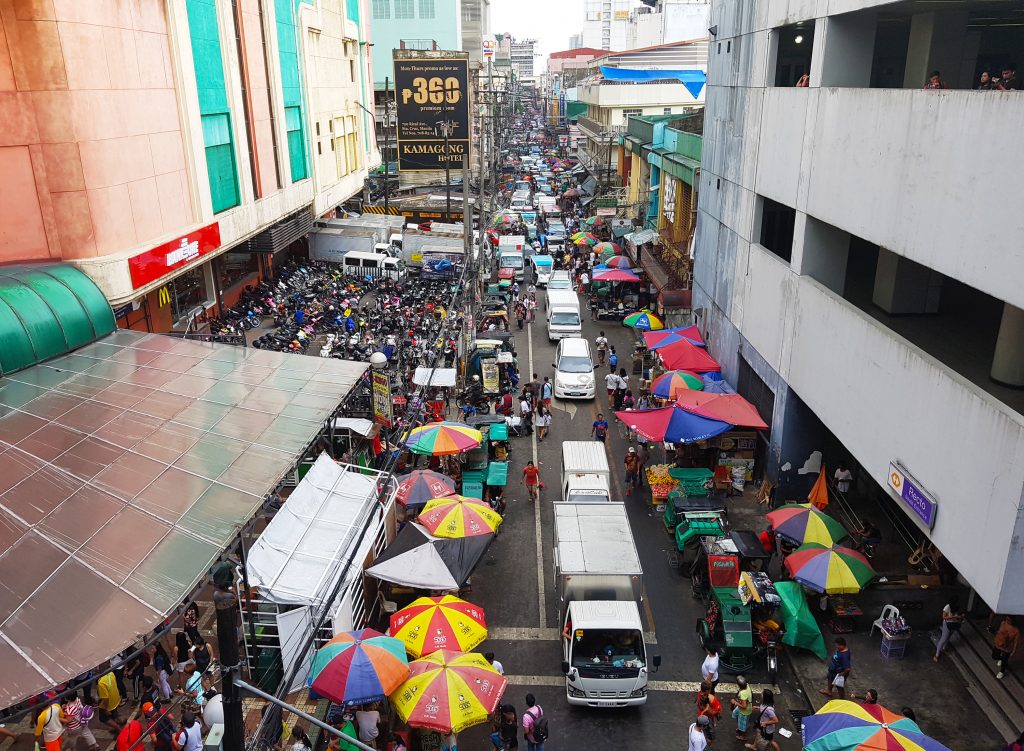
You can see from this shot there really is so much happening. It is very easy to get distracted which is where pickpockets and the “bump and drop” scam take advantage. By all means, enjoy the sights and sounds of the streets as this is often the best way to experience another country. However, just keep your wits about you.
How to avoid this scam:
It is almost impossible to avoid this type of scam because it happens so randomly. However, just like most of the scams discussed in this book, it will usually involve being approached by a stranger of some description either trying to win your trust or to make you feel guilty and take pity on the individual. At the end of the day, it is being aware that these scams can happen. You need to take responsibility for yourself when the situation arises. This means that you shouldn’t accept help from a stranger or give in to the demands of a stranger. This can be very difficult if you are new to the country and don’t have any friends here because everyone is a stranger. However, until you get to know somebody better, there should always be an element of protecting yourself against potential scammers.
SCAM #14: Skin Tax Scam
Unfortunately, as a foreigner, you do become a target for a number of different scams such as those I have highlighted so far in this book. If you are Caucasian, you obviously stand out even more. Even if you have been living here for some time, the locals will still naturally assume that you’re a tourist. Of course, this does have its advantages when it comes to dealing with honest people in the services industry who are genuinely trying to assist you. However, for scam artists, you become an automatic target.
One of the terms that are used in this country by foreigners, and not just in this country but other countries whereas a foreigner you do stand out, is what is known as a skin tax. This means that the price of items automatically increases purely because you are a foreigner, or a tourist, as you are naturally expected to have more money. They may also try to take advantage of you due to the fact you may not be up to speed with local pricing. This can be anything from food in a restaurant, right through to selling your fake items such as those mentioned earlier.
One of the more common ways to do this is by simply not displaying the price of an item. This allows the vendor to conveniently increase the price for you without making it too obvious. This is quite common in the provincial areas and particularly in markets where fresh food is the product concerned.
I even know for a fact that a good friend of mine was scammed during an island hopping boat tour in the world-class tourist destination of Boracay. The crew of the boat insisted that they go to a particular restaurant on a particular island. There were not many tourists there, and my friend was surprised at how expensive the food was. Even though his wife is a Filipino, they still tried to rip him off. He is pretty sure that he saw them bring him a different menu to the one that would probably be given to the locals.
I will say that these types of activities used to be quite rampant but things have slowly improved in this country. However, it still pays to the diligent and makes sure that if you have any doubts, you ask questions of the vendors or the establishments concerned. You are most likely to get ripped off when you least expect it.
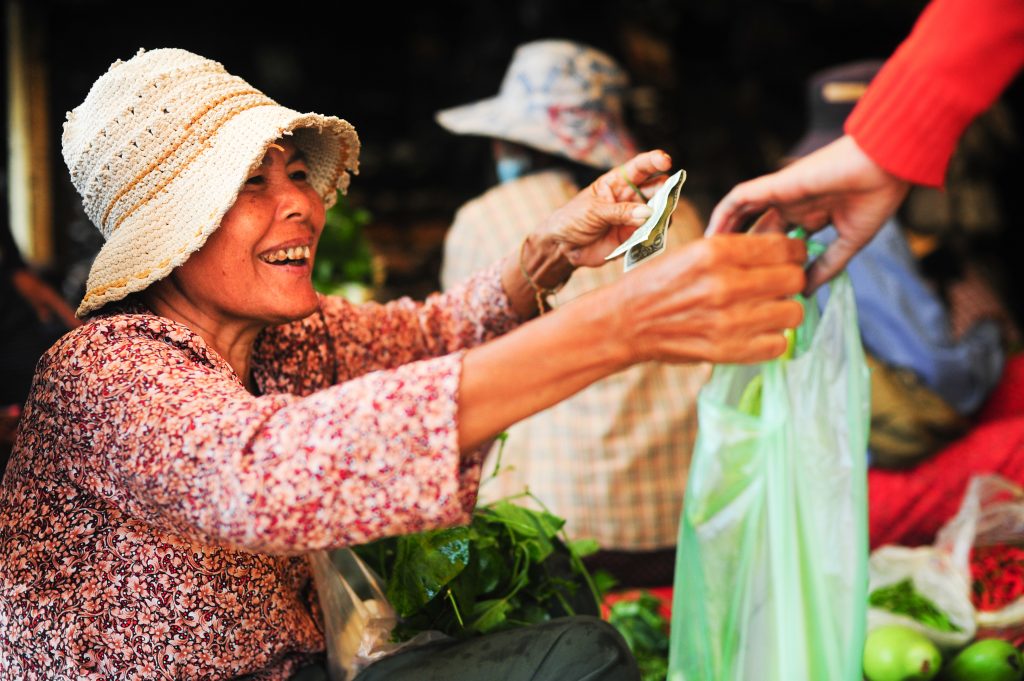
This doesn’t happen all the time, as most Filipinos are honest people. However, there is still a propensity to overcharge on items when vendors see “white skin”. This is known as skin tax and it usually happens in touristy areas as these places are associated with foreigners who are unfamiliar with local pricing.
How to avoid this scam:
Just like some of the other scams mentioned, it is almost impossible to avoid these types of scams as you are usually caught on the spot and don’t have a choice but to pay. However, if you do feel that you have a strong case for being ripped off you can still raise the issue with the vendor which will usually end up in some sort of a price negotiation situation. This will depend on the amount of money at stake, how much time you have and what sort of an inconvenience it will cause to your day. Just like a number of these scams, it may not necessarily lead to losing a lot of money, but it’s the principle of the matter and how hard you want to fight for it.
SCAM #15: Fake Goods Scam
Something that is very common in most Asian countries is fake goods. These items can range from fake DVD movies and viagra right through to mobile phones and computers. Depending on what the item is, this will determine how badly you have been scammed. For example, if you buy a fake t-shirt, as long as it fits and you get to wear it a few times, then that may represent value for money. However, if you spend a little more money on an electronic device for example, and that stops working after a short time, then you have well and truly been scammed.
We all know that fake goods are cheaper than authentic items. After all, this is what makes them so attractive to people. As I just mentioned, some people will know that an item is fake and still purchase it, depending on what value they place on it. However, a lot of the time you may not know if an item is actually fake. I’m not going to go into the intricacies of how to spot fake items, as there are so many different items and so many different versions of them. I could literally write volumes about all the items that are peddled on the streets of the Philippines but for the sake of this article, I will list some of the more common items that you are likely to have thrust upon you in the street (or even in certain stores):
| Mobile phones | Phone accessories | Watches |
| Clothing | Handbags | Shoes |
| Drugs (Viagra and Cialis) | Wallets | Toys |
| Alcohol | Cigarettes | DVD movies/TV series |
| Sunglasses | Jewelry | Pearls |
Of course, there are items of greater size, cost and significance that are also fake. However, the above items are the items that you are most likely to have somebody try and sell you on the street. Then of course, as I have mentioned earlier in the article, as well as selling you fake goods, some of these vendors may just be selling you totally useless items that you have no use for. This can also be used as a distraction to sell fake goods.
How to avoid this scam:
The only real way to avoid this scam is to simply not buy anything from somebody on the street. Of course, if it is an item that is not of significant value and you feel that you will get some use from it then that is your call. Just like with beggars and pickpockets who approach you, my advice is not to engage with these people in any way shape or form. Don’t even say no to them. Just simply keep walking and don’t even make eye contact. Some of these people use this as a distraction to allow their pickpocket friends to relieve you of your goods while you’re being distracted by the salesman.

At the end of the day, no matter what you buy, it is only worth what you’re prepared to pay for it. If you think something is good value, regardless of its authenticity, then it’s your choice if you want to purchase it. However, buying items off the street is always inherent with risks.
Please note that I am not vindicating the trade of counterfeit products. I am merely stating a fact that these items are available on the street and that you will inevitably be approached by somebody trying to sell them. It’ your choice if you choose to buy them.
SCAM #16: Tipping – Scam?
In my view, something that is a borderline scam but is basically tolerated and accepted is tipping. This is even more so if you come from Australia or Europe where tipping is not expected on any level. However, tipping is central to Filipino culture. In Australia for example, we don’t have tipping at all so it’s a new concept to us whereas, for Americans as an example, it’s standard practice. I have put tipping under “scams” as to a certain degree, tipping is a scam if you don’t understand when and where it is applicable or appropriate. And how much should you actually tip?
Tipping is purely subjective, however – Filipinos will expect to be tipped for just about any type of service, regardless of whether or not they have actually done a good job. For example, you will walk into say a hotel lobby toilet and there will be someone there who will hand you a tissue or towel to dry your hands after washing them, and of course, he will expect a tip for simply doing this. In isolation, you might think what the heck, and throw him some loose change once you see the puppy dog eyes, but believe me, after a couple of days, you will be surprised at how many times you will be asked for a tip or be expected to give one. After a while, it does become annoying if you aren’t used to it. Don’t feel bad about not giving a tip at every single occurrence. If someone has earned their tip for good service, sure, go ahead and tip. If not, then you are not obligated.
Another important thing to understand is when you pay for meal or drinks at a restaurant, there is a service charge that gets applied to your bill on top of the VAT. You need to read your receipt carefully to check if the service tax has been charged to you. If this is the case, in theory, you have already paid a tip, so do not feel bad if you don’t leave a tip for the service staff.
How to avoid this scam: As mentioned in the opening of this article, it may be a little harsh putting tipping under a scam. However, if you don’t know how much to pay or when it’s appropriate, then you could be caught out. To me, that is a scam. In the US, they say you should tip about 10% of the total bill. While this may be a rough rule of thumb, it also depends how much the bill actually is.
For example, your bill might be P5,000. If you left 10% that is P500. The average wage in the Philippines is about P350/day so you would basically be tipping them more than their daily salary! In reality, it would be fairly safe to assume they wouldn’t have delivered a level of service that deserves a tip of more than their daily salary! Anyway, you can avoid this by simply not giving a tip at all. However, I think it’s more the gesture that counts so any sort of loose change is better than nothing.
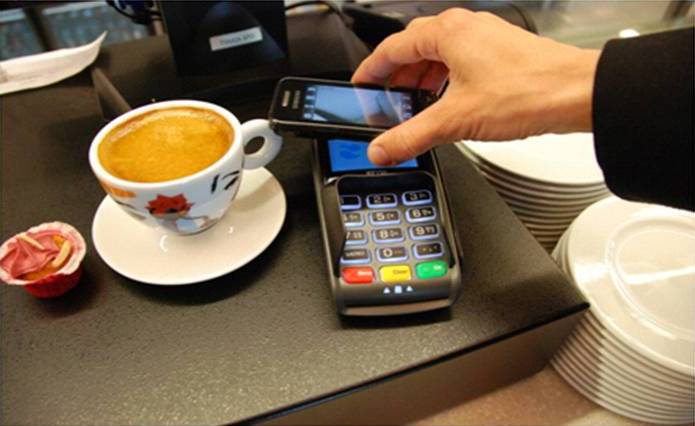
Filipinos expect to be tipped for just about anything, no matter how good or bad their service was. If you come from a country where tips are usually not expected, you might be in for a bit of a shock.
So there we have it, more Survival Tips to help you hopefully avoid some of the most common scams you will be confronted with in the Philippines. For the next survival tip on Philippines Visa Options, please click Survival Tip #7 to read more. If you missed the previous survival tip on Communication in the Philippines, click Survival Tip #5 to read more. If you have any comments or if you have fallen victim to a scam in the Philippines, please feel free to leave your comments below. I would love to hear from you and it may also help someone else avoid being ripped off.
Philippines Fun Fact:
The Philippines is the second largest archipelago in the world and is made up of 7,641 islands located in the South China Sea, Philippine Sea, Sulu Sea, Celebes Sea, and the Luzon Strait (courtesy of https://www.factretriever.com/philippines-facts).


